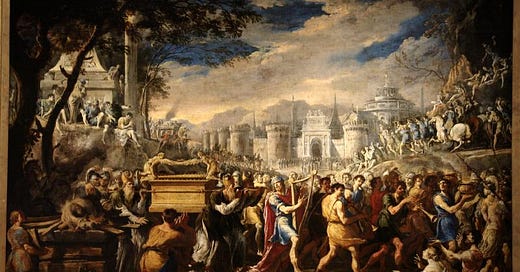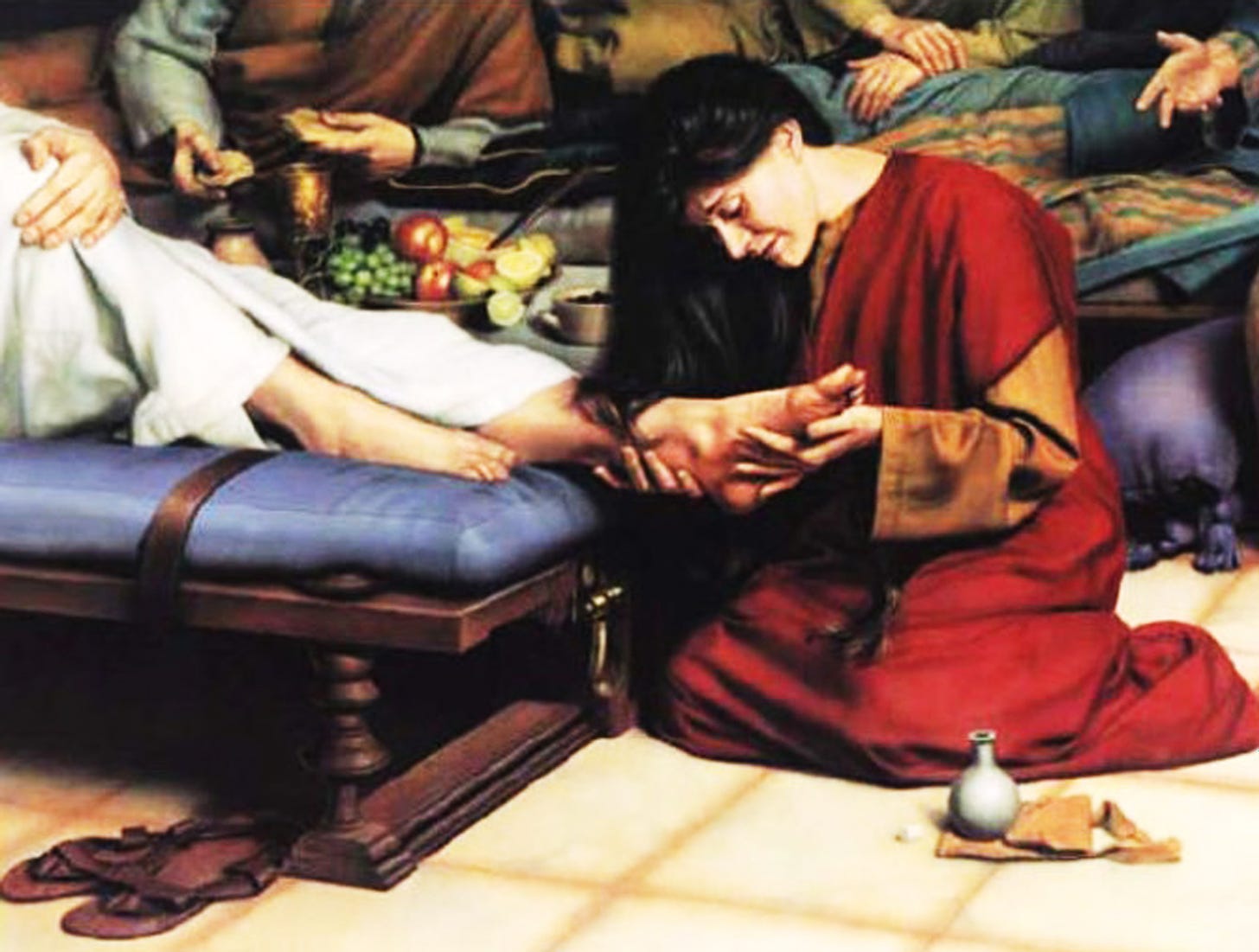God Always Defends Extravagant Worship
Our hearts become hard when we judge the worship of others instead of humbling ourselves, focusing on the Lord and joining in the celebration.
And I will be even more undignified than this, and will be humble in my own sight.
2 Samuel 6:22
David’s burning passion was to be close to God. This was the desire of his heart. In the secret place, David had experienced intimacy with the Lord. He discovered the power of God’s presence through praise and worship. Between playing his harp before Saul and Samuel’s school of minstrels, he had seen how the atmosphere could be shifted through prophetic songs. So when God appointed David as King, the culture of the kingdom would reflect these values, priorities, and passions. What David experienced personally began to manifest corporately.
The Procession of the Ark
David had decided that Jerusalem would be the new capital of Israel, and he also located the ark of the covenant, which was previously stationed at the town of Kiriath-Jearim. David understood that the Ark was the place where the nation of Israel was privileged to get a taste of heaven on the earth.. God’s presence and voice flowed from between the cherubim on top of this golden box (Samuel 6:2, I Chronicles 13:6). If David wanted his nation to publicly experience God’s presence the way he had in private, he needed to put the Ark in the center of the life of their kingdom and establish constant praise and worship in their city. This was David’s top priority as the new king of a united Israel.
After some brief deliberation with his military leaders, David was ready to proceed. They would gather all Israel in a great procession to bring the ark of the covenant into Jerusalem (I Chronicles 13:1-4). It was time for Israel to host the presence of God. Just as the Philistines had returned the Ark to Israel on a cart (I Samuel 6), David set the ark on a new cart to journey up the mountain of Zion, where David had established his palace. The worship procession had begun!
David again gathered all the chosen men of Israel, thirty thousand. And David arose and went with all the people who were with him from Baale-judah to bring up from there the ark of God, which is called by the name of the Lord of hosts who sits enthroned on the cherubim. And they carried the ark of God on a new cart.... 2 Samuel 6:1-4
But David’s first attempt to transport the ark failed. As the ark was being carried on a cart, pulled by oxen, the oxen stumbled. Uzzah touched the ark to steady it and died instantly. (2 Samuel 6:6, I Chronicles 13:9). In fear, David took the ark and left it at Obed Edom’s house (who was a Gentile, curiously). Obed-Edom’s house was blessed by the presence of the ark of the covenant as it rested there for three months before David would try again.
The ark of the Lord remained in the house of Obed-Edom the Gittite for three months. And the Lord blessed Obed-Edom and all his household. 2 Samuel 6:11
I often wonder what happened in David’s heart and life during those three months while the ark rested at Obed-Edom’s home. Interestingly, the 1 Chronicles account breaks up David’s story after the ark rests at Obed-Edom’s house, and it takes chapter 14 to tell the story of David fighting two battles. Before each of these battles it says that David “inquired of God” (I Chron. 14:10,14) for a battle strategy. Each time God gave David a different plan, and each time he was victorious.
The timeline is not clear about whether the battles took place before or after David’s first attempt to bring the ark to Jerusalem. But either way, I believe the Chronicler is trying to teach us something about the three-month delay. David had to learn to follow God’s voice and His ways. He had to remember to “inquire of God” for every step along his journey. Just as David’s victories in battle were dependent on “inquiring of God,” he would also need to seek God for every step of the establishment of his tabernacle of worship in Jerusalem. God had a unique plan for David. Hearing and obeying the voice of the Lord would be vital.
After reviewing God’s laws, David remembered that the ark was to be carried on the shoulders of Levites, not on an ox cart. The ox represents the strength of humanity and the cart represents man’s way of doing things. God was helping David understand that His presence was only to be hosted by true worshipers. No man-made structure or system would suffice to house the manifest presence of God. It was the hearts, lives, and praise of consecrated worshipers (in this case, the Levites) who could “carry” the glory of God into their city.
When David saw Obed-Edom being blessed by the presence of the ark for three months, he finally decided to try again to carry it to Jerusalem (2 Samuel 6:12). But for round two, a few things had changed. First, David pitched a tent and prepared a place for the ark. Second, David commanded that the ark should be carried on the shoulders of the Levites, not an ox cart.
David built houses for himself in the city of David. And he prepared a place for the ark of God and pitched a tent for it. Then David said that no one but the Levites may carry the ark of God, for the Lord had chosen them to carry the ark of the Lord and to minister to him forever. And David assembled all Israel at Jerusalem to bring up the ark of the Lord to its place, which he had prepared for it. I Chronicles 15:1-3
For the second worship parade, David brought up the ark again—this time carried by Levites—offering burnt sacrifices to God every six steps. This procession was a massive celebration with extravagant offerings of worship. It says David assembled “all the house Israel” (2 Samuel 6:15) as he “went and brought up the ark of God from the house of Obed-Edom to the City of David with gladness.” (6:12) David “danced before the Lord with all his might” (6:14) and was seen “leaping and whirling before the Lord” (6:16). The Levitical musicians were appointed “to be the singers accompanied by instruments of music, stringed instruments, harps, and cymbals, by raising the voice with resounding joy“ (I Chronicles 15:16). This was an elaborate parade of burnt offerings, music, and celebration. Can you imagine the sounds, sights, and smells as they marched ten miles from Obed-Edom’s house to their capital city?
They eventually reached the pinnacle of Mt Zion and set the ark into the new tent beside King David’s palace. They offered a final burnt offering (this would be the very last burnt offering ever offered at David's tabernacle), and then they distributed a meal to all the people. The burnt offerings had ceased,the procession had ended, and the people returned to their homes. Yet the songs of praise around the ark continued. David had appointed musicians to remain before the ark to worship the Lord day and night.
Why This Waste?
The joy of this special day came to an abrupt halt when David returned home. David’s wife Michal did not appreciate David’s enthusiasm for God’s presence, or the way he involved himself in the priesthood of Israel.
Now as the ark of the Lord came into the City of David, Michal, Saul’s daughter, looked through a window and saw King David leaping and whirling before the Lord; and she despised him in her heart….And Michal the daughter of Saul came out to meet David, and said, “How glorious was the king of Israel today, uncovering himself today in the eyes of the maids of his servants, as one of the base fellows shamelessly uncovers himself!” (v.16, 20)
David had set aside his “kingliness” in order to worship with the common people and to serve as a priest for all of the nation. Rather than wearing his crown, he wore an ephod, a priestly garment (2 Samuel 6:14), to make way for the King of Kings. He wanted to give people access to God’s presence, so he humbled himself dramatically during the procession of the ark. He rejoiced with abandon that God’s glory would be in the center of his kingdom. David ultimately recognized that God was to be the true king of Israel.
His wife was offended that someone of high regard such as the king would humble himself as David did. Something inside her resented the extravagant worship that David offered God as he danced and sang in the streets. After this altercation, Michal was never able to bear children again (v.23).
Likewise, I believe the fruit of the religious spirit is barrenness in one’s soul. Fear, accusation, and judgement caused by prideful religion causes the flow of spiritual life in our hearts to become barren. Our hearts become hard when we judge the worship of others instead of humbling ourselves, focusing on the Lord and joining in the celebration.
For radical worshipers, many times the passion and pursuit of God’s presence is misunderstood or shunned by those around us, and sometimes by those very close to us; especially anyone under the influence of a religious spirit. This is not shocking. Hell hates the presence of God. Religiosity reacts strongly to extravagant expressions of worship and attempts to create fear that hinders freedom and joy. The enemy accuses the radical worshiper by asking “Why this waste?” Why should David offer a burnt every six steps along the way to Jerusalem? Why did he have to gather all of Israel and go to such great expense to usher God’s presence into his city? Why such a big deal over the ark? Didn’t David need to deal with the economy and the military? Didn’t he need to maintain his place of dignity and notoriety as the king of Israel?
This is not the only time in the Scriptures where extravagant worship stirred up controversy. The woman who broke the alabaster jar of perfume upon Jesus is one of the clearest examples of this same principle.
Now when Jesus was at Bethany in the house of Simon the leper, a woman came up to him with an alabaster flask of very expensive ointment, and she poured it on his head as he reclined at table. And when the disciples saw it, they were indignant, saying, “Why this waste? Matthew 26:6-8
“Why this waste?” In response to a lavish demonstration of devotion, the enemy mocked with accusations of foolish excess. But Jesus affirmed the sacrificial offering of love and called it a “beautiful thing” (Matthew 26:9). Throughout the Bible, God always defends extravagant expressions of worship and those who prioritize His presence. Whether it is King David’s undignified worship, Mary who sat at the feet of Jesus, or the woman who poured the alabaster jar of perfume on Jesus’s feet, costly expressions of worship were always celebrated by the Lord.







